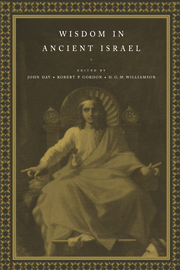Book contents
- Frontmatter
- Contents
- List of abbreviations
- Introduction
- Part 1 The ancient near eastern setting
- Part 2 Old Testament and Apocryphal texts
- 4 Foreign Semitic influence on the wisdom of Israel and its appropriation in the book of Proverbs
- 5 The limits of theodicy as a theme of the book of Job
- 6 Qoheleth
- 7 A house divided: wisdom in Old Testament narrative traditions
- 8 Wisdom in Solomonic historiography
- 9 Amos and wisdom
- 10 Hosea and the wisdom tradition: dependence and independence
- 11 Isaiah and the wise
- 12 Jeremiah and the wise
- 13 The wisdom psalms
- 14 Wisdom and Daniel
- 15 Ecclesiasticus: a tract for the times
- 16 The Christian use and the Jewish origins of the Wisdom of Solomon
- Part 3 Themes
- Biographical note: John Adney Emerton
- Bibliography of the works of John Adney Emerton
- Indexes
- Principal biblical and apocryphal references
15 - Ecclesiasticus: a tract for the times
Published online by Cambridge University Press: 16 October 2009
- Frontmatter
- Contents
- List of abbreviations
- Introduction
- Part 1 The ancient near eastern setting
- Part 2 Old Testament and Apocryphal texts
- 4 Foreign Semitic influence on the wisdom of Israel and its appropriation in the book of Proverbs
- 5 The limits of theodicy as a theme of the book of Job
- 6 Qoheleth
- 7 A house divided: wisdom in Old Testament narrative traditions
- 8 Wisdom in Solomonic historiography
- 9 Amos and wisdom
- 10 Hosea and the wisdom tradition: dependence and independence
- 11 Isaiah and the wise
- 12 Jeremiah and the wise
- 13 The wisdom psalms
- 14 Wisdom and Daniel
- 15 Ecclesiasticus: a tract for the times
- 16 The Christian use and the Jewish origins of the Wisdom of Solomon
- Part 3 Themes
- Biographical note: John Adney Emerton
- Bibliography of the works of John Adney Emerton
- Indexes
- Principal biblical and apocryphal references
Summary
Often Ben Sira's own words have been used to describe his book: he spoke of himself as ‘a gleaner following the grape-gatherers’ (xxxiii 16). Rightly regarded as one of the last of the traditional wisdom writers, he gathered up the loose ends of his predecessors in that genre. Such a description, however, does not do him enough credit, as it ignores the differences that exist between his own book and the work of the authors of Proverbs and Ecclesiastes. Certainly he gleaned a great deal from the Old Testament and used widely the literary genres of both wisdom literature and psalmody as well as adding others. But the real, lasting significance of his book can best be seen against the historical background of its authorship – only when we look at the political and social circumstances of Sirach's own time can we appreciate that he is not just summing up the past, but using the wisdom tradition positively for his own time. The phrase ‘a tract for the times’, often used of the book of Daniel and its relevance to Maccabean times, is no less true of Ecclesiasticus just before the Hellenistic reform. However, Sirach writes in his own name (1 27) without attributing his words to some ancient worthy as do Proverbs and Ecclesiastes, which both claim Solomonic patronage (though in different ways); even the author of Daniel hid behind an exilic personage. The Greek translation by Sirach's grandson even betrays a strong family interest, almost like a family firm of publishers! To see the reasons and circumstances of both authorship and translation we should examine the historical situation when Sirach wrote.
- Type
- Chapter
- Information
- Wisdom in Ancient Israel , pp. 170 - 181Publisher: Cambridge University PressPrint publication year: 1995



